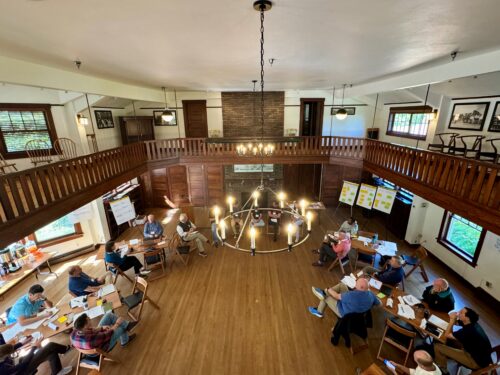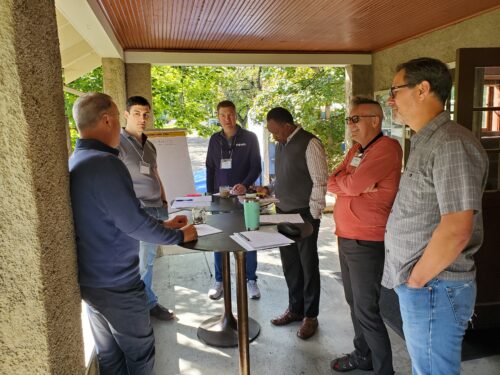
Mike McMeekin & Kyle Davy
In his new book, Wicked Problems, Guru Madhavan of the National Academy of Engineering tells the story of Ed Link, the inventor of the flight trainer for pilots which transformed the aviation industry in the early 20th century by addressing the educational, workforce, and cultural challenges that accompanied the rapid development of aviation technologies. Link’s technological expertise and systems approach addressed a significant challenge of his time. In the 21st century, we face an even more volatile, uncertain, complex, and ambiguous (VUCA) world. The 2024 Engineering Change Lab – USA (ECL) Engineering Ideas Institute featured a deep dive into the role of the engineering community in this VUCA world. Madhavan posed a key question to the participants in the Institute, “What is the equivalent of a Link trainer for engineering in the 21st century?”
Day One
Madhavan kicked off the Institute highlighting stories from Wicked Problems that framed his taxonomy of problems.
| Problem Type | Definition | Example | Outcome |
| Hard | Well-defined and solvable with existing tools and techniques. | 1919 Boston Molasses Tank Failure | SOLVED
|
| Soft | Involving human behavior, complicated by political and psychological factors. No clear-cut solutions. | Recovery from 2011 Fukushima Nuclear Accident | RESOLVED |
| Messy | Emerging from conflicting values, beliefs, and ideologies. | Ebola Outbreaks | DISSOLVED
(using compromises and trade-offs) |
| WICKED | Emerge when hard, soft, and messy problems collide. | Climate Change | SYSTEMS
ENGINEERING APPROACH |
Participants in the Institute brainstormed their thoughts on the most significant VUCA challenges facing the engineering community such as:
- Leadership (creating a shared vision, embracing different perspectives, leading change).
- Declining trust in science and engineering.
- Fewer students in the engineering pipeline.
- Climate change and extreme weather.
- Emerging technologies such as AI.
- Profit versus purpose.
Participants saw several common elements in dealing with these challenges, including the need for humility. They saw humility for engineering practitioners as embracing multi-disciplinary approaches, moving beyond simply following the directions of funders, offering our knowledge and experience to decision-makers, having excellent communication skills centered on listening, and having the ability to facilitate groups of stakeholders.
The perspective of the next generation of the engineering community on the VUCA challenges of the future was provided by a panel of engineering students from the University of Colorado Boulder. The students cited climate change and the associated issues of water conservation, transitioning to zero emission energy systems, learning from and correcting the mistakes of the past, and the need for global changes as key challenges. They see the need for their generation to adopt ethical, inter-disciplinary approaches to wicked problems, rebuild trust in engineering, and seek purpose, centered on creating a better world in their work. They also expressed frustration with empty promises and rhetoric in favor of determined actions to create real change now.
John Poulsen of The Nature Conservancy (TNC) kicked off the exploration of climate change as a wicked problem, provided an overview of how we have created our own crisis, and suggested a set of key steps that people and society need to take in the face of this challenge. He highlighted three examples of TNC’s success in changing agricultural practices across the globe that (using the lexicon of Wicked Problems) are helping to dissolve the wicked problem of climate change. The TNC approach is people-centered – based on building relationships and trust before implementing any solutions and emphasizes working with local communities to build their capacity to change and adapt.
Institute participants then discussed the macro-ethical dilemmas associated with addressing climate change. Participants brainstormed a lengthy list of potential dilemmas and then explored four of these dilemmas in detail – renewable energy adoption / land use concerns; managed retreat from vulnerable coastal areas; increased use of AI / increased power and water demands; and public good / private property rights. A key approach to these explorations was the need for the engineering community to shift away from polarized thinking about these dilemmas. Other reflections from participants included recognition of the general absence or lack of macro-ethical considerations in the business models of private sector organizations as well as in engineering education. ECL’s Creative Director and Lead Facilitator Kyle Davy offered a process for macro-ethical dilemmas – notice; pause; gather information and reflect; and decide / act.
Day Two
Mark Abbott of Engineering Change Lab Canada kicked off Day Two of the Institute with his presentation of “AI as a Wicked Problem.” Mark led an exploration of the proliferation of AI as either problem or opportunity. He described the four elements of AI stewardship.
- Orienting ourselves within the rapidly evolving AI landscape.
- Exploring the perspectives of others and sharing our own.
- Deliberating about tensions between perspectives.
- Illuminating new pathways forward.
ECL Canada’s new AI Stewardship Practice Program will focus on shaping the landscape of AI for the benefit of all. Mark described AI stewardship as a way to shape the impact of technology on our physical and mental evolution.
Participants then participated in a group exercise that utilized scenario thinking to imagine the future of AI. Participants formulated future scenarios related to AI’s impact on education, transportation, and medicine and health care. Insights from these scenarios included the need to give up the traditional identities tied to engineering disciplines, our ethical obligation to care for the casualties of major changes stemming from AI, the multi-disciplinary aspects of all the scenarios, and the inevitability of collateral damage.

Kristen Uhlenbrock of the Institute for Science and Policy at the Denver Museum of Nature & Science addressed the prevalence of misinformation, disinformation, and malinformation in a VUCA world. The impacts of this trend are threats to trust institutions, weakening of democratic societies, and greater divisions in society. To build trust in institutions, like the engineering community, Kristen highlighted the Institute’s practices of recognizing complexity; embracing the “messy human” (biases, self-interests, and values); and learning to disagree respectfully and define what the debate is about. In the end, from Uhlenbrock’s perspective it is all about building meaningful relationships through empathy, humility, and deep listening.
Participants reflected on Uhlenbrock’s message, both individually and in a group exercise. Key insights are highlighted below.
- There is need for all in the engineering community to recognize that our own worldviews can shape the information we seek out and our messages to others.
- While there is trust in the technical expertise of the engineering community, there is contention around policy, i.e., building the right projects, not just building the projects right.
- Politics and the public can drive decisions that supersede the recommendations of the engineering community. This could be an indication of lack of relationship-building and public outreach.
The final wicked problem examined at the institute was the recent emergence of the pushback against DEI programs and the implications of this emerging trend for the engineering community. Provocateurs Yolanda Webb of WEBB Advisory Group, Rico Thomas of Civil Technology Inc., and Bryan Dewsbury of Florida International University offered different perspectives on this issue. Yolanda challenged participants to be daring not daunted in the face of this trend. Rico cautioned against shifting to the extremes of the issue and the need to focus on effective execution of programs. Bryan discussed his teaching philosophies that have resulted in remarkable results for students from marginalized communities, encapsulating the reasons why DEI exists. Institute participant Ademola Adejokun also offered his presentation on workforce progression. He cited all our obligations to inspire young people to pursue engineering and to create multiple pathways and on-ramps to opportunities.
Participants found this topic to be both emergent and emotional. Further consideration of the topic is needed throughout the engineering community. A key consideration in these discussions is the element of “growing the pool” of the engineering community versus the zero-sum philosophy that is often attached to DEI. We have multiple reasons to “grow the pool.”
- We need to increase our contributions to the challenges that society faces, which is the core purpose of ECL. Over the long term, this will require increasing our workforce.
- There is a need in the engineering community to do our work differently than we have done in the past. We have a much greater chance of achieving this if our workforce reflects the communities we serve.
- There is a moral imperative to correct our 200-year history of unequal opportunity.
Day Three
In the closing dialogue of the Institute, participants considered the question, “What do we think we have learned about the leadership mandate for the engineering community with respect to our VUCA future?” Several of the insights from the dialogue are cited below.
- The word “mandate” implies the need for action and includes accountability and responsibility.
- The engineering community would significantly benefit by understanding and applying the perspective about wicked problems offered by Guru Madhavan.
- We can’t just play victim to wicked problems – we can learn new ways of leading to help society face, adapt to, and dissolve them.
- Our work needs to be informed by the idea of building capacity in communities that was presented by John Poulsen of TNC.
- We need to have the humility to know when we should lead, but also be aware of the concept that “leadership can happen in any chair in the orchestra.” We can base our actions on an understanding of our level of authority.
Provocateur presentations from the Institute are available on the Knowledge Hub page of the ECL website. Look for full documentation of the Engineering Ideas Institute soon.

